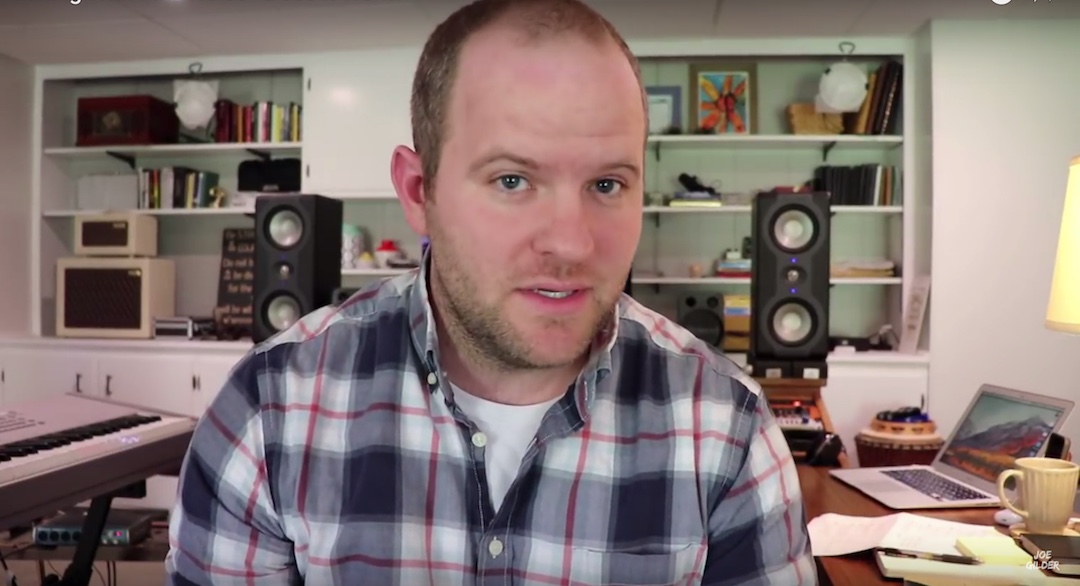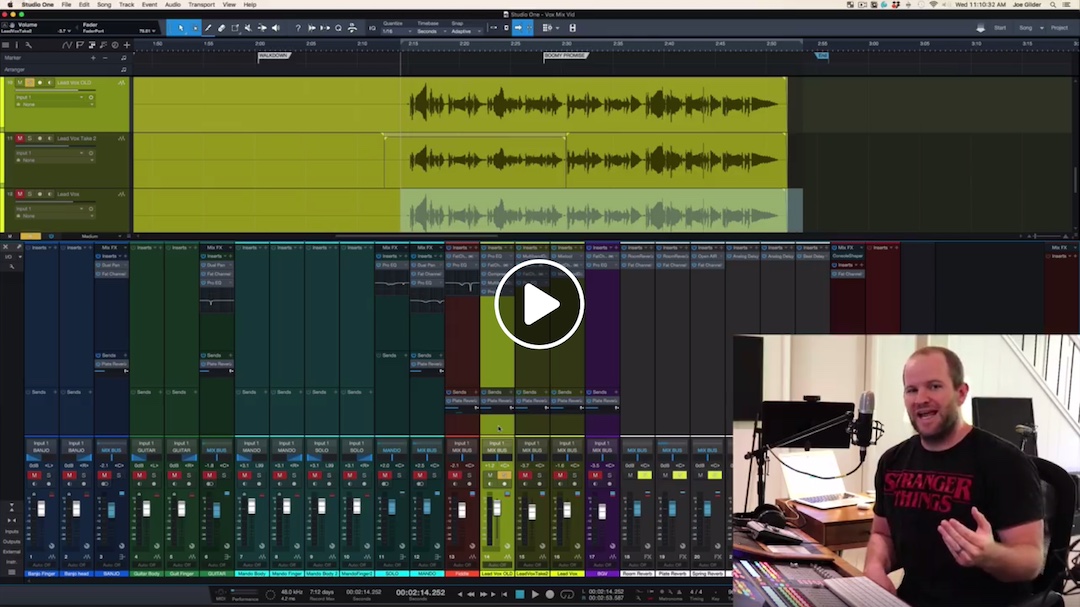The Home Studio Mix Coach: Joe Gilder
As musicians, we’re either painfully or gleefully aware that the landscape of the music business has changed radically over the past 10-15 years.
These changes—both the positives and the negatives —have inspired (or forced) all music makers who attempt to earn their living through music to begin thinking of new and creative ways of keeping the lights on. One such creatively thinking music maker is Joe Gilder.
The Mississippi-born, Nashville-based Gilder is not only a talented singer-songwriter, guitarist, producer, engineer and mixer but is also the mastermind behind Home Studio Corner; a popular (and profitable) audio blog. Through “HSC”, Joe can be found offering both free and paid audio training programs amongst a myriad of other services from mix critiques to full-on song production.
I caught up with Joe to discuss his musical journey, his creative approach to the music business and his life as a working musician and audio entrepreneur in the 21st century.
Just to give us a sense of your musical path, could you offer us a little background—how you became a musician and what gave you the studio bug?

Joe Gilder has built his skills in music production into a business, helping others make the most of their own home studios.
I grew up in a fairly musical family. My mom sings and plays piano. My dad sings and plays some guitar. I took piano lessons as a kid, and picked up one of my dad’s guitars when I was around 13.
I soon got obsessed with learning how to play guitar, which led to writing songs and eventually to recording those songs. I was hooked. The whole process was thrilling for me. I would lose hours and entire days recording music.
You studied audio engineering in college, right? What was that experience like for you?
Yep. I decided I wanted to be a rock star, and I figured if I learned how to do the audio side of things, that could only help. So I studied audio production in college. That’s when I realized that being on the other side of the glass was just as fun and creative as being the one holding the guitar and singing the songs. Again, I was hooked.
I’ve heard you say that after college you worked at the web-based music retailer, Sweetwater Sound. I’m curious as to how much of that experience helped lay the foundation for your future work at Home Studio Corner and your role as a musical entrepreneur?
I was not the entrepreneurial kid growing up. I never dreamed of running my own business. Sweetwater seemed like a nice, safe option for me after getting an audio production degree. I was newly married and thought a steady paycheck would be a wise move.
For the uninitiated, could you tell us about your baby, Home Studio Corner – how it came into being, what it’s all about, its business model?

Gilder gives away free material, and sells premium content, including courses like “Understanding EQ”, and subscription services like “Dueling Mixes”.
Most musicians dream of recording their own music, but they become frustrated by the complexity involved. Home Studio Corner provides training courses and memberships that give people the tools and experience they need to finally start making great-sounding music on their own.
HSC started as a pet project while I was working at Sweetwater. I started writing articles and creating YouTube videos and podcasts. Eventually I built an audience and an email list and began creating paid courses and memberships.
Over the last nine years I’ve created over 20 courses and two memberships, in addition to hundreds of free YouTube videos and articles. I’m helping people accomplish their dream of releasing great-sounding music out of their home studios.
Although your business and its execution is a thoroughly modern affair given the tools and techniques you employ, it strikes me as also being a throwback to an earlier time, before the big paydays of commercial recorded music, when working musicians had to diversify to make a living—a teaching gig on Monday, a jingle session on Tuesday, a club date on Wednesday… What are your thoughts on that?
The entire concept of a “full-time musician” is relatively new. Historically, musicians have often had “regular jobs” in addition to making music. You do what’s necessary in order to make a living. Musicians have always worn multiple hats.
I knew I wanted to have a career in music. I thought that would be as a touring musician, but my path took a different turn. I stumbled across a way to take something I love—writing and recording music—and create enough value around it to create a profitable business.
I feel extremely thankful that I get to do what I do. I make music and help other people make music. I get to run a business and sell products that make people’s lives better. How cool is that?
You seem to use a number of creative and multifunctional models in your business. For example, when you’re recording a track for yourself as an artist for retail release, you might also use that session to illustrate a mix concept in a free training video, while at the same time making the raw stems from the session available for sale to students for mix practice purposes. Were these kinds of ideas part of the business plan from day one, or did they evolve over time, through trial and error?
Early on I knew I needed to be constantly making music if I was going to be able to create content that connects with people. It gave me something to share. Any time I make music—or do anything really—I think about how I can double that effort. For example, if I create an EP of new music, I will likely create a video course on how I mixed the songs and also provide the multi-tracks for some of my customers to mix. That and I have a new EP of music to share with the world.
I’m a bit of an efficiency nerd. I like to make the most of my time and opportunities.
You create a lot of free video and audio content and enjoy a loyal following on YouTube and iTunes. How important are tools like YouTube and podcasting to your business?
They are massively important. I don’t make money directly from YouTube, but YouTube has been the network through which I’ve connected with thousands of people—people I probably couldn’t have connected with a few decades ago.
Lastly, any parting advice for working musicians and engineers looking to harness their creativity for beyond the norm, business/entrepreneurial purposes?
Always think in terms of value.
Too many musicians are hung up on the fact that “people don’t pay for music anymore.” If that’s you, you have two options: 1) You can continue to complain about how the world has changed. 2) You can find a new way to make yourself valuable to the market.
It requires work and failure, but it’s also an exhilarating adventure.
Big thanks to Joe Gilder for offering up some insight into the resourceful ways in which he adds value to his community while also managing to make a living inside the framework of the modern music business. Nice work if you can get it, indeed.
Check out Joe and his blog at homestudiocorner.com
Mark Bacino is a singer-songwriter based in New York City. When not crafting his own melodic brand of retro-pop, Mark can be found producing fellow artists, composing for television/advertising and teaching songwriting via his Queens English Recording Co.
Mark also is a Guitar World contributor and the founder/curator of intro.verse.chorus, a website dedicated to exploring the art of songwriting. Visit Mark on Facebook or follow him on Twitter.
Please note: When you buy products through links on this page, we may earn an affiliate commission.






